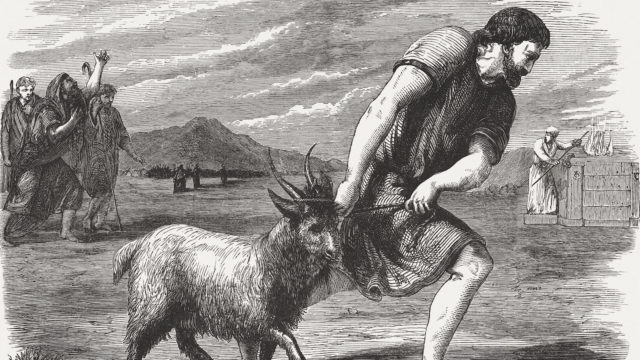One notable thing about the Bible, from the Old Testament, is that sins are transferrable. Just as debt is transferrable in an economy. So the Bible establishes a…Sin Economy.
“…in the death of Christ the “guilt” of sin is transferred to Christ from believers. Though we are all “guilty” as sinners before God; we can rest and trust that Christ took upon himself the guilt of those who trust in him.” – source
In the Old Testament, Abraham is to sacrifice his son Isaac, but then God opens the first Sin Bank, and accepts a goat in his stead. Exodus and Leviticus are practically financial tables listing the sin value of goats, sheep, and pigeons. Then there’s the annual scapegoat, in which the sins of the tribe are transferred to the goat, which God accepts as payment; the goat “redeems” them, or their sins, or something; the goat is an abstract, transferrable currency.
With the advent of goats as redeemable currency, sin/debt is transferrable. The sin economy expands like crazy, as animals redeem human sin debts. You can have way more sin when you don’t have to pay for your own. Sure, there is some cost to keeping/herding goats, but it’s mostly “externalities” – it’s goats and Nature bearing those costs, more than humans. Humans mostly service the institution.
Goats, sheep, and turtledoves are Old testament commodity money, but the New Testament creates fiat currency in Jesus. The Bank of Jesus relies entirely on faith, and the sin economy expands yet again.


Was it also Jesus who instituted the economical reform releasing children from the debt of their dead parents? Cancelling the whole “sins of the fathers payed by their children for seven generations” thing. That must have been damaging to the goat-raising establishment.
True, but this is not merely a shoving off of one’s faults into goats and other “externalities”. It is only after one has acknowledged that one has some blame that the economics of sin can begin. Nowadays we seem to have lost this “me first” moment. We seem to have gone into a universal blaming of others or the institutions for whatever happens to me (“me too” = I am a victim too, I am not the one to blame). So the economics of sin seems to already begin with the externalities, no?
In the beginning, it was easy to load the sins of all people on to the goat’s back and let it go so the people were clean as a whistle. One day, suddenly; the god died. No more divine help to do the cleaning. People needed to clean their own mess. No more symbolism. Toilets exploded with sewage and nobody has any tool or power (or even worse, a want for it). Someone should ask people to go to Mars for a short period and then clean the world with a high-pressure cleaner, but everyone is warm and happy in this pile of shit. People will persist in dreaming of salvation and affirmation but the next hero will not come until we decide what kind of nail we will use on him (or may be her this time).